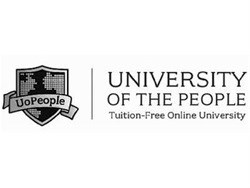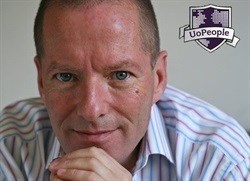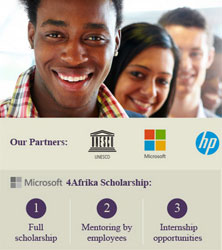
Top stories

ICTToo little, too concentrated: why AI startup funding in Africa needs rethinking
Claire Zanuso 6 hours





More news



ESG & Sustainability
Redisa calls on govt to fix South Africa’s “broken” waste management system
























Founded by Reshef in 2009, the California-based online university is his way of giving back. He's been involved in various education programmes for 20 years, but came fully to appreciate the power of online learning during the collaboration of KIT eLearning (founded by Reshef) with the University of Liverpool - the only snag was the cost.

"On the one hand we had this great tool that could educate so many people; on the other hand, most of the people couldn't afford it. I ended up selling this university (KIT eLearning) and the rest of my business to go into semi-retirement, just to realise that it wasn't for me. I thought to myself - It's my turn to give back, but I want to do it in a way that will have an impact on the world and, for me, having an impact on the world can only be done through education," explained Reshef, in an interview with Bizcommunity.
This is no fly-by-night effort - UoPeople has been granted a licence to offer four undergraduate degree programmes: Associate of Science Degree in Business Administration or Computer Science and a Bachelor of Science Degree in Business Administration or Computer Science. While Reshef believes these degrees are most likely to help the university's students find a job, they are considering offering others that are just as important, such as those in health services and education.
However, it's been four years since the university opened its virtual doors and it's still awaiting accreditation. Legally bound from providing an ETA for its accreditation, Reshef points to the high-profile academics on UoPeople's Presidents Council as an indication of the institution's quality and credibility: John Sexton, president of New York University; Stephen Joel Trachtenberg, resident emeritus and university Professor of Public Service at The George Washington University; Nicholas Dirks, chancellor of the University of California, Berkeley; Sir Colin Lucas, vice-chancellor of the University of Oxford from 1997 to 2004; among others.

The list certainly has its fair share of academic clout, but still questions have arisen about how the university proposes to circumvent student fraud - Reshef provided some clarity: "When students get accepted, we first of all verify their credentials very carefully, including the (high school) diploma. If we cannot verify it, then you will not be accepted.
"The next stage is while they study - the way our students study with us is very interactive, it's peer-to-peer learning. Every week they spend time with their peers; they interpret and discuss the material and lecture notes under the supervision of the instructor. So every course has an imparter, which is one out of our 3000 volunteers.
"By the end of the course they take exams and the exams are proctored. The exam is sent to a third person, the student goes to that person, he identifies the student's identity, and the student takes the exam in front of him. So, while we are studying online, there is an element of face to face, and this is not actually with other students," explained Reshef.
Reshef is currently in South Africa recruiting 100 students for Microsoft's 4Afrika scholarship - these South Africans will be part of the 1000 African students enrolled at UoPeople in 2014 under the software giant's scholarship. Applicants needs to apply and be accepted at UoPeople - prerequisites include proficiency in English and a valid high school diploma (matric certificate); an extra course on English is offered. Once accepted, students can apply for the Microsoft scholarship, during which they will undergo a screening process.

"Their [Microsoft's] goal is to choose the best qualified African students. As soon as they pass the Microsoft screening, which includes further essays and an interview, and perhaps even other elements, they can start the programme. If they are accepted, they get a full scholarship; while they study they get access to Microsoft certified programmes and courses, they get mentored by a Microsoft employee, an internship with Microsoft or its partners and, upon graduation, they have job opportunities with Microsoft."
UoPeople is tuition-free, but there are certain administrative costs that need to be covered in order for the university to reach its target of sustainability by 2015. Students are asked to pay an application processing fee ranging from USD10 to USD50 (residence-dependent), as well as for each exam they take at USD100 each; according to Reshef, this amount will make UoPeople sustainable when it has 5000 students in 2015: "It is important to note that in order to achieve that, we need to make sure that our students are either able to pay or there are enough scholarships to help them pay. So, for that very reason, we team up with quite a few corporations that create scholarships for our students so they can apply - Microsoft is obviously the most significant example, but also, for those who cannot find any scholarship, we created a micro-scholarship where [they] can present their case and ask our supporters to help them - they say how much they need and our supporters give as much as they are willing to give."
While the partnership is one of the reasons Reshef is currently in South Africa, the other is to attract other corporations to possibly offer scholarships: "It is our mission to accept everyone who is qualified and, since we are online, we have room for everyone and we have the quality because of who is behind the university, but we also have the capacity to accommodate many students. In order for them to be able to study, we need someone to come and say they will help those out who cannot afford it with a scholarship," said Reshef.
According to Reshef, in 2025 there will be an estimate of 100-million students around the world who will not have seats in the existing universities. He doesn't consider the online tuition-free model a threat to traditional universities, but the online model will be there to fill the gap.
"The thing is the world cannot continue building more and more face-to-face universities, cannot incur costs, and cannot handle it. Online will take more place, especially because, the more time goes by, more and more people will realise that online provides a valued and quality education. The future will have a variety of offers for students to choose from," said Reshef, sharing his vision of higher education for future generations.
Shai Reshef is the president of the University of the People. An educational entrepreneur, Reshef has over 20 years of experience in the international education market. He was selected as the Ultimate Game Changer in Education in 2010 by The Huffington Post. In 2012, he was nominated as one of Wired Magazine's 50 People Changing the World and as a Top Global Thinker by Foreign Policy Magazine. Source: uopeople.org
For more information on UoPeople, go to http://www.uopeople.org/.
For more info on the Microsoft 4Afrika Scholarship, read Tuition-free opportunity for young South Africans.
Watch Finding Einstein: Shai Reshef at TEDxKC
